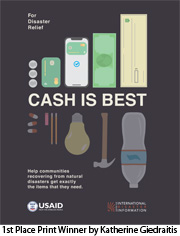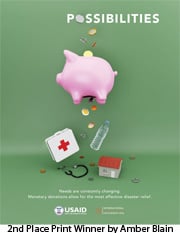BookTrib's Bites: Inspirational Stories to Suit All Tastes
(NewsUSA)
(NewsUSA)
 "In the Black"
"In the Black"
by Andrew Ceroni
The CIA's most valued Russian double agents are being methodically assassinated one by one.
When the Agency discovers the attacks originate from a Russian top-secret cyberwarfare program called Chernyy Almaz or Black Diamond, a mind-control program, the CIA must respond swiftly to shut down the attacks and extract its top agents before they're lost forever.
Among them is Dr. Armand Mishenkov, head of Russia's research for cold fusion weaponry. Mishenkov escapes to Ukraine, but freedom is still far from his reach. Pursued by Russian assassins and Spetsnaz teams, agent Dave McClure and partner Tony Robertson must find Mishenkov and smuggle him across Europe and to the United States. Can they make it alive? Purchase at https://amzn.to/3uK5e68.
 "Hello Whimsy"
"Hello Whimsy"
by Jean Ngo
In this fun children's book, Whimsy the cat tries to make friends, ironically, with birds! When another furry feline comes along, does this make a great match because they are both cats? Whimsy travels through the day meeting one creature after another -- but has her challenges. Find out in this tale about socializing beyond the genus-surface! And learn how beautiful frienships get started.
The author lives in Southern California with her fur baby Misty, after whom Whimsy is modeled. Jean likes to spend her time off talking to roses, daydreaming or having a cup of tea. Purchase at https://amzn.to/3xnM4UO.
 "Functional Dysfunction: From Sour Grapes to Fine Wine"
"Functional Dysfunction: From Sour Grapes to Fine Wine"
by Dr. C. Errol Ball
Life can be a bumpy ride, and for some of us, our greatest challenges can present themselves as early as childhood and in the worst of ways. How we deal with those early challenges is often what will shape our world and how we see it.
As a physician and a minister, the author bears witness to both the joys and the sorrows of his patients and congregants. He sees the world as an interplay of body, mind and spirit. And at the intersection of these pieces of his life, he has come to find that every experience -- whether painful or pleasant -- offers an opportunity for growth, a chance to turn our sour grapes into a fine wine. Purchase at https://amzn.to/3w92q3p.
 "Riding the Executive Roller Coaster: Medical Staffing Cases "
"Riding the Executive Roller Coaster: Medical Staffing Cases "
by Kelli Christina
This is a fictionalized book based on real-life events and court cases that went unnoticed by the public eye over the period of a decade. The author plays the primary role in the book, which covers the trials and tribulations of professional offices at their highest and lowest moments.
The consequences of handling business and professional issues in the wrong manner or even illegally can escalate and destroy many lives along the way. The book follows the long path of success and falling in despair over lawsuits and loss; it includes all the important life lessons to be learned along life's path. Purchase at https://amzn.to/3onrwZb.
NOTE: BookBites is presented by BookTrib.com.
(NewsUSA) - Offices around the country are finally opening back up. According to census.gov, more than a third of Americans are still working from home , but the number of people getting back into their daily commutes-and their work clothes -- is growing every day.
- Offices around the country are finally opening back up. According to census.gov, more than a third of Americans are still working from home , but the number of people getting back into their daily commutes-and their work clothes -- is growing every day.
In the APA's Stress in America™ poll conducted in February 2021, 42 percent of Americans reported undesired weight gain during COVID-19 quarantines, lockdowns and work-from-home time. Their average weight gain: 29 pounds.
To get back into a healthier routine once you head into the office, Courtney McCormick, registered dietitian and manager of clinical research & nutrition at Nutrisystem, offers these simple tips.
Pile on the Produce: Even the odds and help yourself stay on track when you clock in. Load up on non-starchy vegetables such as cucumbers, peppers, carrots and more each day because they're loaded with vitamins, minerals and fiber, but they're low on calories. The fiber helps you feel full without filling out.
Pack Satisfying Snacks: Healthy snacks may be the most important option you can give yourself at the office. When you start to feel that 3 p.m. slump, it can be so easy to grab one of those coworker-brought bagels or hit the vending machine. Being prepared with satisfying options can help you make food decisions to meet your health goals.
Make Meals Ahead: Meal prepping ahead of time can help you stay on track when it's time to eat at the office. Pre-portioned meals such as those from Nutrisystem or power bowl recipes are a great healthy lunch meal prep option because they are easy to grab and go, yet heartier than a salad. You can also whip up several servings of chicken in the slow cooker or on the grill to pair with steamed veggies all week long.
Stay in the Know: Once you've got your healthy meal prep underway, arm yourself with information. When a coworker invites you to lunch or happy hour, you're going to want to be there-it's the first one in more than a year! So give yourself the info to concentrate on the experience without stressing about your order. Look at the menu online before you head out so you can see which options are best for your healthy lifestyle.
To add to your efforts, don't forget to stay hydrated and active during the workday. Pack a water bottle to refill during the day and plan to meet a co-worker for a lunchtime walk. For more great tips, visit Nutrisystem's The Leaf at leaf.nutrisystem.com.
(NewsUSA)
This past year, back-to-back hurricanes in Central America, the COVID-19 pandemic, and ongoing conflicts in Syria, Yemen, and Ethiopia have increased the need for international aid as well as people's desire to help. Although many people want to support global disaster relief efforts, most people don't know the most effective way to contribute, according to the U.S. Agency for International Development's Center for International Disaster Information (CIDI).

When it comes to supporting international disaster relief efforts, monetary donations are the best way to help. Every disaster response is unique and cash contributions are fast and flexible, allowing relief organizations to purchase exactly what is needed, when it's needed and support local economies. Donating material goods such as food, water, and clothing, incurs additional costs, including transportation and storage, and may be culturally inappropriate or otherwise hinder relief efforts.
To promote the message that cash is best, USAID sponsors an annual Public Service Announcements for International Disasters contest (PSAid) for college students, recruiting them to create PSAs in three formats: print, video, or digital. The contest entries this year included nearly 90 submissions from 11 universities. All 2021 winners hail from Arizona State University, making this the first clean sweep in the PSAid contest's 15 year history. Entries were judged by a panel of five experts from the humanitarian and communications fields.

Additionally, three entries were selected as the winners of the People's Choice competition, an opportunity for the general public to vote on their favorite contest entry in each category on the PSAid website.
"I learned that donating physical items to overseas disasters often does more harm than good," says Molly Gaffey, People's Choice winner in the video category and University of Michigan student. "Although these items are provided in good intention, they come with barriers that can be avoided with monetary donations."
Some winning PSAs will be featured in prominent magazines or aired during popular television programs, and will be also used in CIDI's 'Cash is Best' education efforts.
Some common myths about donating cash to help international disasters include:
MYTH: I cannot donate enough money to make a difference.

FACT: Even a small donation can help international disaster victims. In Haiti, $5 will buy a life-saving course of antibiotics. In Zimbabwe, a $10 donation can provide regular healthcare to 90 people for a year. In Java, $50 provides a one-month food supply to volunteers rebuilding homes for earthquake victims. (Source: www.globalgiving.org).
MYTH: If I donate cash, most of it will go to administrative costs and not directly to help the victims.
FACT: There are numerous reputable international disaster response agencies which dedicate monetary contributions directly to relief programs in the field. It is important that contributors feel comfortable with their charity of choice and research their methods as appropriate. Cash donations have far greater impact than donated goods.
Visit PSAid.org for more information and to view the winning PSA entries.